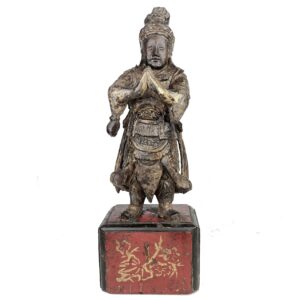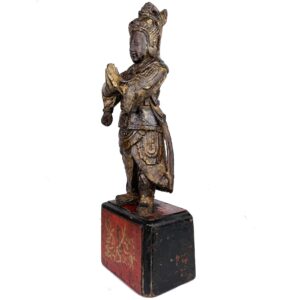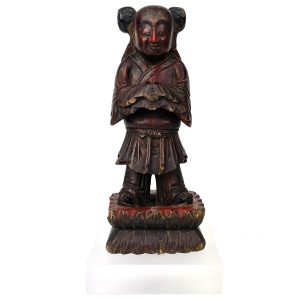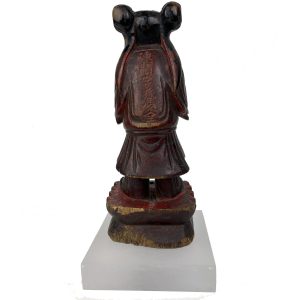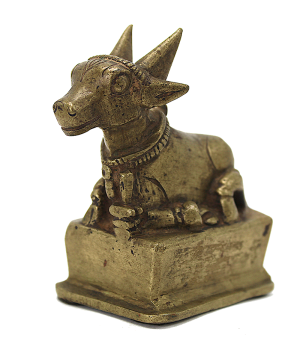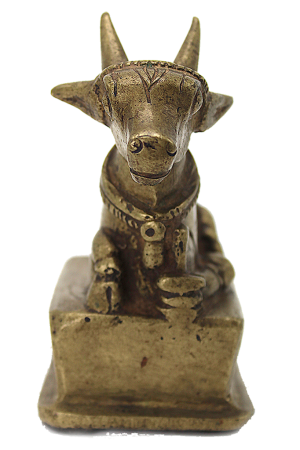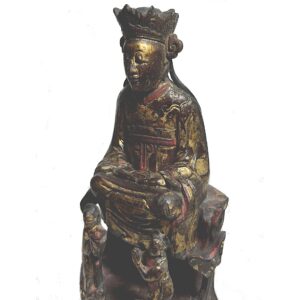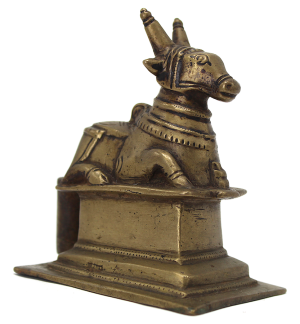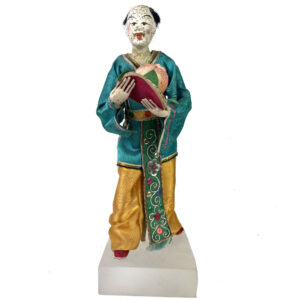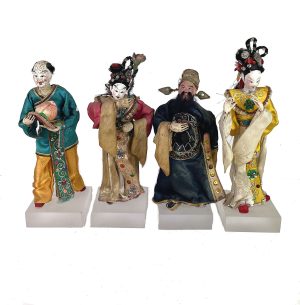-
Sale!


$695.00 Original price was: $695.00.$395.00Current price is: $395.00.
H: 16.25: W: 5.875” D: 3.5” | FOR SHIPPING INFORMATION CONTACT US AT 213-568-3030
Attendant Chou Ts’ang, to Guandi, most revered Chinese military hero and Taoist God of War, hands clasped and eyes down in respect wearing detailed military clothing and boots on high pedestal with painted gold florals.
-


$2,450.00
Attendant figures are usually presented on an altar in pairs flanking revered figure they honor. This lovely carving is an enlightened being indicated by her pendulous ears, an elevated flowing ribbon, and blissful smile. She traditionally carries offerings which might be food, fruit, medicine, or other unique items. Her extremely pleasing face highlights her modesty as…
-


$485.00
This sweet diminutive antique-Chinese-wood-carving of an enlightened Buddhist attendant on a double lotus base that was commissioned by the proud father to celebrate and bless a marriage as indicated by the inscription on the rear 陈门李氏双全 that indicates that it belonged to the Lee family. Although its meaning is not entirely clear, it appears to…
-


$155.00
Nandi is among the most frequent Hindu deities worshiped in public places, temples, homes, or on a home altar throughout India. As one of Hinduism’s mythical animals, Nandi is Shiva’s vahana, (his mount that transports him), attendant and leader of his attendants and guardian of all four-footed animals. A recumbent image of Nandi on a…
-
Sale!


$425.00 Original price was: $425.00.$250.00Current price is: $250.00.
Ht: 8.25″ W: 3″ D: 2.125″ | FREE SHIPPING IN CONTINENTAL US!
Dressed in a red robe with a high neck collar, extremely wide sleeves extending below the knees and a belt around his waist, this ancestor figure portrayed as a civilian official standing on a rectangular base with hands together wearing a long civil official’s robe that extends to his shoes but has no rank badge indicated.
-


$595.00
Statues of attendants often appear as a pair looking inward and flanking a deity, unless they are very important ones and look straight ahead. They may carry a range of offerings. This antique Chinese woodcarving appears to be a Taoist image likely placed on a home altar along with deities, house gods and ancestors to…
-


$395.00
In China a set of earthenware Zodiac attendant figures was made as a 12 piece grouping, with each figure holding a small calendar animal with each year represented by a different animal – rat, ox, tiger, rabbit, dragon, snake, horse, goat, monkey, rooster, dog, and pig or boar – in a repeating 12-year cycle. Although…
-
Sale!


$1,350.00 Original price was: $1,350.00.$1,200.00Current price is: $1,200.00.
H: 11.5″ W: 6″ D: 4.5″ | FREE SHIPPING IN CONTINENTAL U.S.
Nanhai Guanyin on Mount Putuo sits as a triad with acolytes Shan Tsai hands in prayer and the Dragon Princess offering the “illuminating pearl.” Very rare Ming sculpture on an Acrylic base is one of our favorites VA collection carvings.
-
Sale!


$650.00 Original price was: $650.00.$395.00Current price is: $395.00.
H: 7.75” W: 3.5″ D: 3.5″ | FREE SHIPPING within continental U.S.
Rare and charming carved attendant pair to flank deities on circular pedestals presenting boxed offerings with ribbons as wish for longevity.
-


$245.00
Nandi is among the most frequent Hindu deities worshiped in public places, temples, homes, or on a home altar throughout India. As one of Hinduism’s mythical animals, Nandi is Shiva’s vahana, (his mount that transports him), attendant and leader of his attendants and guardian of all four-footed animals. A recumbent image of Nandi on a…
-
Sale!


$195.00 Original price was: $195.00.$135.00Current price is: $135.00.
H: 9.25″ W: 3.125″ D: 3″ | Free SHipping within continental u.s.!
Originally mounted on the wood stick between his legs and now inserted to its acrylic stand, this vintage male doll is an attendant offering a huge peach. His large oval head is almost bald and his black hair remains only in a small patches on the sides of his head. He wears a typical colorful folk-art Chinese dance costume: bright red shoes, yellow pants, a greenish-blue coat with florals, a high sequined yellow belt, and a wide blue sash outlined with silver and gold thread and colored 5-petal silver sequin plum blossoms hanging down to the base evoking a wish for the Five Blessings or Happinesses. It is in very good condition with expected wear and minor paint losses and charming spotting on the face.
End of content
End of content

